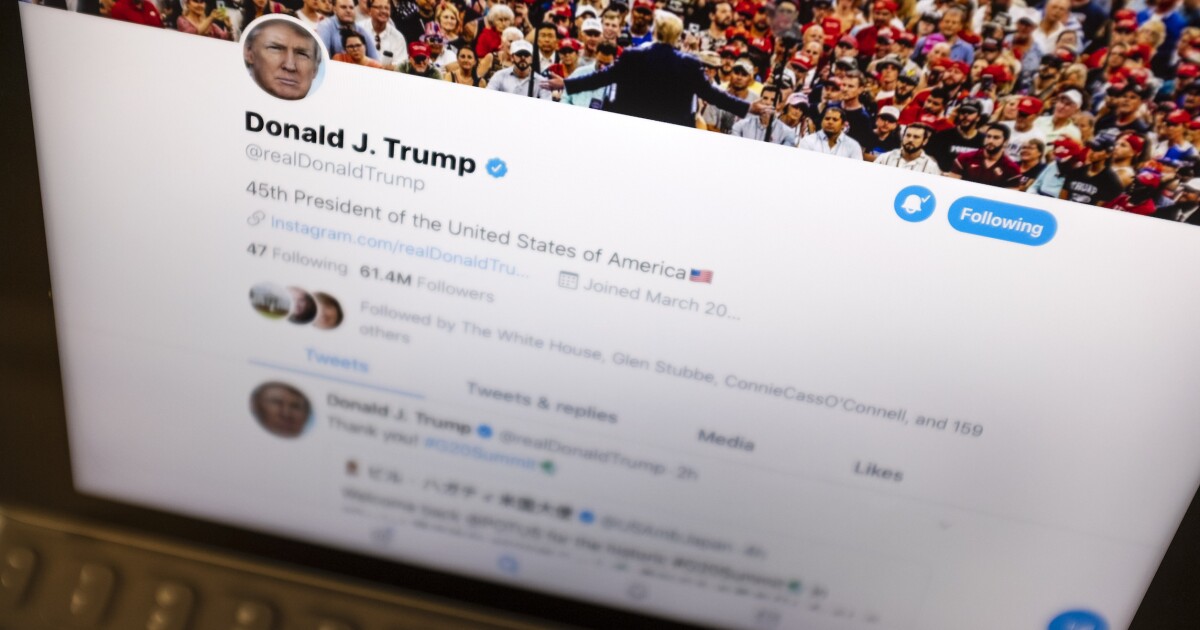

The latest release of the Twitter Files reveal shifting opinions among executives about how to handle the effects of January 6 and the protests.
The fourth edition of the Files was released by journalist Michael Shellenberger on Saturday, and went into details on Twitter’s changes in decision making on Jan. 7, the day after thousands gathered and rushed the Capitol in an attempt to overturn the 2020 election results.
Senior executives at Twitter “create[d] justifications to ban Trump,” attempt to “seek a change of policy for Trump alone distinct from other political leaders” and “express[ed] no concern for the free speech or democracy implications of a ban,” claims Shellenberger.
TWITTER FILES: DONALD TRUMP’S REMOVAL FROM PLATFORM EXPLAINED IN LATEST RELEASE
1. TWITTER FILES, PART 4
The Removal of Donald Trump: January 7
As the pressure builds, Twitter executives build the case for a permanent ban
— Michael Shellenberger (@ShellenbergerMD) December 10, 2022
Yoel Roth, the former Twitter Head of Trust and Safety, had pushed for a change to Twitter’s rule system where a user who violates the platform’s terms of service five times lead to a permanent suspension. The new system was approved late Jan. 7, according to messages sent by Roth to colleagues. They
“The exchange between Roth and his colleagues makes clear that they had been pushing [former Twitter CEO Jack Dorsey] for greater restrictions on the speech Twitter allows around elections,” Shellenberger argued.
The change in rules doesn’t appear to directly affect Trump’s future on the platform due to him only having one strike on the account.
That policy shifted later in the day. When asked by a sales executive they’re dropping the rules around “public-interest exceptions” and justifying removal at any violation, Roth said that Twitter is “changing our public interest approach” in Trump’s case in order to say that “any violation would result in suspension.”
Twitter has maintained a policy of leaving content published by elected officials up in the case of violations if they believe it “directly contributes to understanding or discussion of a matter of public concern.”
What happens next is essential to understanding how Twitter justified banning Trump.
Sales exec: “are we dropping the public interest [policy] now…”
Roth, six hours later: “In this specific case, we’re changing our public interest approach for his account…” pic.twitter.com/XRUFil2npI
— Michael Shellenberger (@ShellenbergerMD) December 11, 2022
“I feel a lot of debates around exception stem from the fact that Trump’s account is not technically different from anybody else,” An Twitter engineer said in a text to Roth. “and yet [Trump is] treated differently due to his personal status, without corresponding Twitter rules to clarify responsibilities that should come with that status.”
“You’re spot on,” Roth responds. He notes that policy is a major part of how it works and claims Twitter “ran into the world changing faster than we were able to either adapt the product or the policy.”
Roth’s response hints at how Twitter would justify deviating from its longstanding policy. “To put a different spin on it: policy is one part of the system of how Twitter works… we ran into the world changing faster than we were able to either adapt the product or the policy.” pic.twitter.com/wGMvuoS7u3
— Michael Shellenberger (@ShellenbergerMD) December 11, 2022
Shellenberger also claims that he found no evidence of employees expressing concerns about the free speech effects that banning the former president would have besides a single comment from a junior employee.
Shellenberger’s release is the latest in a series of threads posted by him and fellow reporter Bari Weiss regarding the internal machinations of Twitter. Weiss published details about Twitter’s “blacklist” policy on Thursday, while Taibbi provided details about the website’s ban on a New York Post story about Hunter Biden’s laptop. The third entry in the Files was released on Friday and detailed Twitter’s internal dialog about content moderation and how to handle election misinformation.
CLICK HERE TO READ MORE FROM THE WASHINGTON EXAMINER
The results have been contested, with critics arguing that the Twitter Files have not revealed any significant or new information about the platform.







